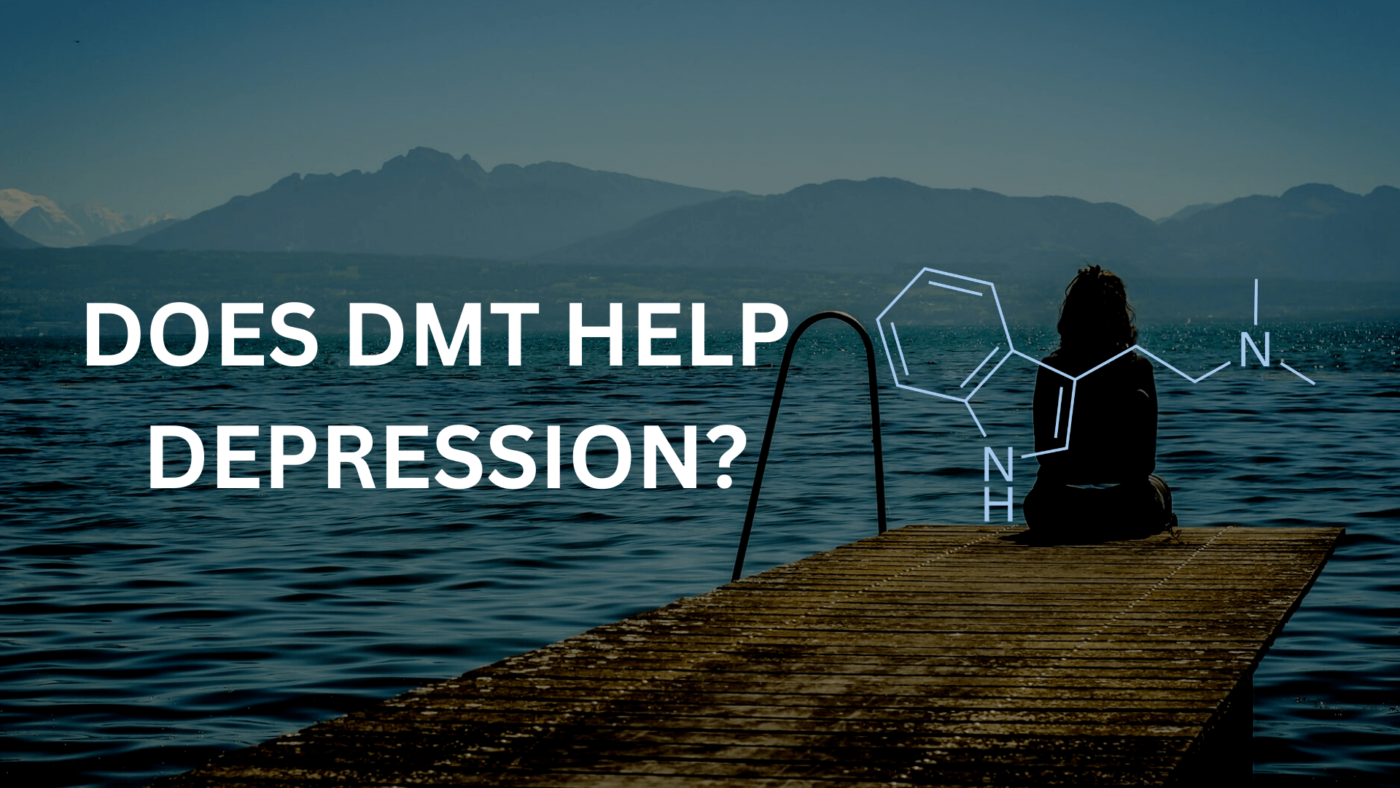blog
Does DMT Help Depression?
N, N-dimethyltryptamine (DMT) is a hallucinogenic tryptamine drug that people often call the spirit molecule. Even though DMT is illegal in Canada, it is being looked into as a possible treatment for mental illnesses like anxiety and depression.
Traditional antidepressants often make you wait a few weeks before you can tell that your mood is getting better. In addition, it is well known that they don’t work for about a third of the people who try them. This shows how important it is to find different ways to help people with depression.
Researchers have found and studied several possible alternatives in the past few years. DMT, like other psychedelic chemicals like lysergic acid diethylamide (LSD) or magic mushrooms, makes you have visual and auditory hallucinations.
What Is DMT?
DMT is a white powder that crystallizes and can be brewed, smoked, or vaporized to be taken orally, snorted, or injected directly into the bloodstream. This powder is derived from plants around South America, Mexico, and Asia, such as Psychotria Viridis and Banisteriopsis caapi. The main psychoactive ingredient of DMT is Ayahuasca, a traditional Amazonian plant medicine believed to bring spiritual enlightenment.
The pineal gland in the brain is in charge of making DMT naturally in the body. When DMT is taken by mouth, its effects can happen very quickly. The effects of plant-based brews can kick in from 20 to 60 minutes after you drink them, but synthetic DMT can start anywhere from 5 to 10 minutes after drinking.
DMT as a Hallucinogenic
Most hallucinogens are put into two groups: classic hallucinogens or dissociative drugs. Some of the “classic hallucinogens” are DMT, LSD, peyote (Mescaline), and psilocybin. On the other hand, dissociative drugs include ketamine and salvia.
The National Institutes of Health (NIH) says that hallucinogens change how a person sees time, colors, movement, senses, and themselves. People who take hallucinogenic drugs often say they see images, hear sounds, and feel things that are not real but seem to be.
Hallucinogens have also been linked to psychotic episodes, which can last long even after the user stops taking the drug. People can also get addicted to hallucinogens. For example, if a person takes a hallucinogen repeatedly, they will need to take a higher dose each time to feel the same effects.
Hallucinogen addiction or tolerance can lead to dangerous behavior, injury, or even death due to the altered perception of reality. If you are abusing DMT or know someone who does, you need to learn more about it and get help from a professional. Read more to find out about DMT addiction and substance abuse.
A Brief History of DMT
Richard Manske, a Canadian chemist, is credited with being the first person to synthesize DMT in 1931 successfully. At the time, though, no one had looked into how it could be used in human pharmacology. It was not until 1956 that the psychedelic effects of DMT were discovered. Stephen Szara, A Hungarian psychiatrist, and chemist, Stephen Szara, consumed it after extracting it from the Mimosa hostilis plant. This led to the study of many different plants with DMT, which led to the discovery of several hallucinogens.
In the 1950s, many hallucinogenic compounds were found, and it was found that these substances changed human perception and behavior. Evidence also showed that mammals, including humans, can make DMT-related chemicals independently. About sixty studies were done to determine whether these chemicals are in the body’s fluids. But no clear link was found between the amount of DMT in body fluids and any mental illness.
The Science Behind DMT
Tryptamines are a group of hallucinogens called serotonergic or classical drugs. Serotonergic hallucinogens are a group of drugs that affect serotonin and are used to get high. DMT stops serotonin from acting how it should work in the brain. Serotonin is a neurotransmitter that helps nerve impulses get from one part of the body to another.
Serotonin also controls many essential bodily functions, such as digestion, sleep, and mood. Too little or too much serotonin in the body can significantly affect the person’s mental and physical health. DMT is an agonist at the 5-ht2a serotonin receptor but does not choose which serotonin receptor it binds to. It also acts as an agonist at serotonin receptors in other brain parts.
DMT’s hallucinogenic effects may be partially caused by activating serotonin receptors. At the same time, the amount of dopamine and adrenaline created decreases when serotonin is made. Dopamine is a neurotransmitter critical to the body’s physical and mental functions. It is involved in the brain’s “reward center,” affecting many functions, such as memory, movement, emotion, and attention.
The psychedelic effects of DMT depend on the dosage and how it is taken
When DMT is used on its own, it is often snorted, smoked, or injected. Unlike taking DMT by mouth, injecting the drug into a vein or muscle makes the effects happen much more quickly.
It is hard to tell how long it will take for the effects to reach their peak when smoking DMT. But when taken as a drink, the effects may take longer and peak between two and three hours later.
When DMT is taken by mouth, it needs to be paired with a monoamine oxidase inhibitor (MAOI) so that it can be broken down and its effects on the body get stronger. One example of an MAOI is the ayahuasca vine. Some adverse effects of DMT include:
- Hallucination
- Depersonalization
- Confusion
- Increased heart rate and blood pressure
- Chest pain or tightness
- Agitation
- Dizziness
- Pupil dilation
- Psychosis
- Seizures
Many people who have tried DMT claim it profoundly changed their lives. This can include both mystical and near-death experiences. The journal Frontiers in Psychology says that near-death experiences (NDE) happen simultaneously with death or when a person feels about to die.
An evaluation system called the NDE scale was made to determine how much DMT causes near-death experiences. Based on the results, it seems likely that DMT and NDEs have a lot in common.
The so-called “ego death” has also been linked to psychedelic drugs. When someone has an “ego death,” they forget who they are and what everything is for a short time. Because of this, a person’s view of life can change significantly.
Is DMT Effective in Managing Depression?
Mental health practitioners say that more research is needed to determine if DMT is an effective and safe treatment for depression. DMT and hallucinogens can worsen mental health problems for people who already have them.
DMT has a significant effect on the brain’s chemistry, which is one reason why it can make depression and other mental health conditions worse. Since it is a hallucinogen, people with mental health disorders risk having a bad trip while on it. This can lead to vivid and uncontrollable hallucinations as well as the seeing of horrifying images.
Evidence-based studies about DMT
In January 2021, the Centre for Psychedelic Research at Imperial College London ran the first clinical tests to see if DMT could help with depression.
Dr. Robin Carhart-Harris and Carol Routledge of Small Pharma, a biotechnology company researching psychedelics, both think that DMT could help manage depression. Dr. Carhart-Harris says that DMT seems to increase the “plasticity” of the brain, which makes it easier to change quickly.
Carol Routledge thinks that using psychedelics like DMT to manage mental health problems is better than using traditional pharmaceuticals in several ways. The hallucinogen has been shown to break the brain’s cycle of repeating thoughts, making it easier for new connections to form.
Based on this information, it seems likely that DMT could be the answer to depression when regular antidepressants have not worked. However, this is not enough to conclude that DMT can cure or treat mental health disorders. So, before it can be used to treat mental health disorders, more research needs to be done to fully back up the claims that have been made about it.
Conclusion
Studies and clinical trials on using psychedelic substances like DMT to treat depressive disorders are still in their early stages. Researchers are looking into how these psychedelic compounds could help manage mental health problems in a clinical setting.
Psychedelic-assisted therapy is still in its infancy. Currently, there are a few possible safety concerns about how DMT and other psychedelic drugs could be used. Mental health professionals would have to undergo a lot of training before using DMT for treatment-resistant depression and other depressive disorders.
FAQ
Even though there is no scientific evidence to support the use of DMT for anxiety or major depressive disorder, some people may have experiences with the drug that they see as helpful for these conditions. However, people with a history of mental health problems or who are going through a lot of anxiety or depression may put themselves in danger if they use DMT because it can cause vivid hallucinations and altered states of consciousness.
It is essential to know that DMT is a controlled substance in most countries, including Canada. Thus, using it can lead to serious legal problems. If you need therapy for your anxiety or depression and don’t know where to start, you should talk to a trained medical professional as soon as possible.
But it is important to remember that studies on psychedelics and depression are still scarce, and more research is needed to fully understand how well they could treat depression. It is important to remember that psychedelics can have dangerous and unpredictable effects and should only be used under the supervision of a trained medical professional.
DMT is a hallucinogen in some plants and animals and is also made naturally in the human brain. It is a potent psychedelic that can cause immense and intense changes in a person’s perception, mood, and state of mind. It is thought to play a role in some psychological and spiritual experiences, like near-death experiences and mystical states.
On the other hand, serotonin is a neurotransmitter that helps the body regulate hunger, sleep, and mood. It is responsible for sending messages between nerve cells in the body. Serotonin is made in the brain but is also found in the gastrointestinal tract, which helps digest food.
However, serotonin does not cause hallucinations or other psychedelic effects like DMT. Instead, it plays a more subtle role in controlling mood, sleep, and many other bodily functions. Serotonin also helps make people feel happy and healthy. Low levels of serotonin are linked to mental health problems like depression.
People with depression may benefit from psychotherapy like cognitive behavioral therapy, which can help them recognize and change negative thoughts and behaviors that may make them feel depressed. It is always best to talk to a qualified medical professional before trying any alternative treatment or psychedelic-assisted therapy for a mental health condition.
Consult your primary health physician before using cannabis to help manage your symptoms.

